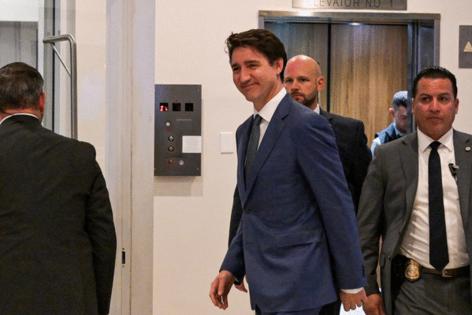Commentary: Trump's targeted tariff proposals are already a notable success
Published in Op Eds
Since his election, President-elect Donald Trump has outlined targeted tariff proposals aimed at addressing pressing international issues. The most successful relates to Canada and Mexico’s responsibility for illegal immigration. Increasingly, targeted tariffs are being used as sanctions in areas well beyond trade policy.
Trump is already discussing his desire to use Section 301, 201 and 232 tariffs in his second term as a diplomatic tool to achieve "America First" ends that go well beyond traditional trade policy. Every statement made by the president-elect is preemptive, intended to drive change ahead of his inauguration.
Trump’s first proposal targets the ongoing border crisis, calling for significant action from Canada and Mexico to curb illegal immigration. Trump suggested that both countries could face a targeted use of tariffs for their role in the illegal invasion of the United States.
Just hours after Trump threatened these tariffs, both countries' leaders reached out to the president-elect. Prime Minister Justin Trudeau even flew to Florida to address Trump’s concerns and ensure compliance with Trump's demands for securing the northern border.
This is what using targeted tariffs to secure good diplomatic outcomes looks like, and it should be celebrated. Our neighbors to the north and south were immediately put on notice, reacting favorably to the American position. This demonstrates that the world respects Trump, and American leadership on the global stage is making a comeback.
Conversely, the Biden administration permitted Mexico and other countries to walk all over U.S. interests and violate treaties with the U.S. Only after Trump left office did former President Andrés Manuel López Obrador of Mexico violate the USMCA free-trade agreement by eradicating Mexico’s regulatory bodies and replacing the Mexican judicial system with elected judges, even at the Supreme Court level.
With Trump in charge, Canada has already committed to spend an additional $1.3 billion on border security as a direct response to Trump's skillful use of tariff threats as a baseline negotiating tactic. On Jan. 6, Trudeau announced his resignation, and Trump’s threat of a 25% tariff sanction was a contributing factor. The deputy prime minister and finance minister of Canada, Chrystia Freeland, had already resigned and referenced Trump and his tariff proposal in her resignation letter.
Trump continues to assert American strength on the world stage—something the Biden administration has been reluctant to do—and both allies and adversaries have taken notice.
American allies and adversaries should take note that strong U.S. leadership is returning, and policies such as censorship of free speech or support for Hamas and vilification of the state of Israel could expect meet a harsh U.S. response in the form of tariffs. Vice President-elect JD Vance has suggested economic sanctions against Ireland over its proposed hate speech law.
When presented with arguments for a U.S.-UK free trade agreement for the benefit of both countries, senators, House members and congressional staff have responded with policy concerns over police arrests and prison sentences over Facebook posts in the UK, as well as British police threats to extradite U.S. citizens over social media posts.
Indeed, this issue has recently been addressed by Elon Musk and a recent Senate Judiciary Committee hearing. Trade policy now extends beyond economic considerations and can be used to addressed other policies that relate to American values and the sort of countries with whom we want free trade. Trade policy is now about values, not just commerce.
Bill Ackman has also called for sanctions against the UK over the official cover-up of child rape gangs in the name of political correctness. This is the first time a respected Trump ally has called for sanctions against the UK.
Trump discovered in his first term that the Section 301, 201 and 232 tariffs are tools in the president's toolbox that can be employed without checks from Congress, and he is already making a success of their proposed use, even before formally returning to office.
As former Reagan administration economist Arthur Laffer recently stated, Trump is not the first president to employ these tariffs outside the realm of traditional trade policy “and he is entitled to do so.”
____
Andrew Hale is the Jay Van Andel Senior Trade Policy Analyst at the Heritage Foundation.
_____
©2025 Tribune Content Agency, LLC.




























































Comments